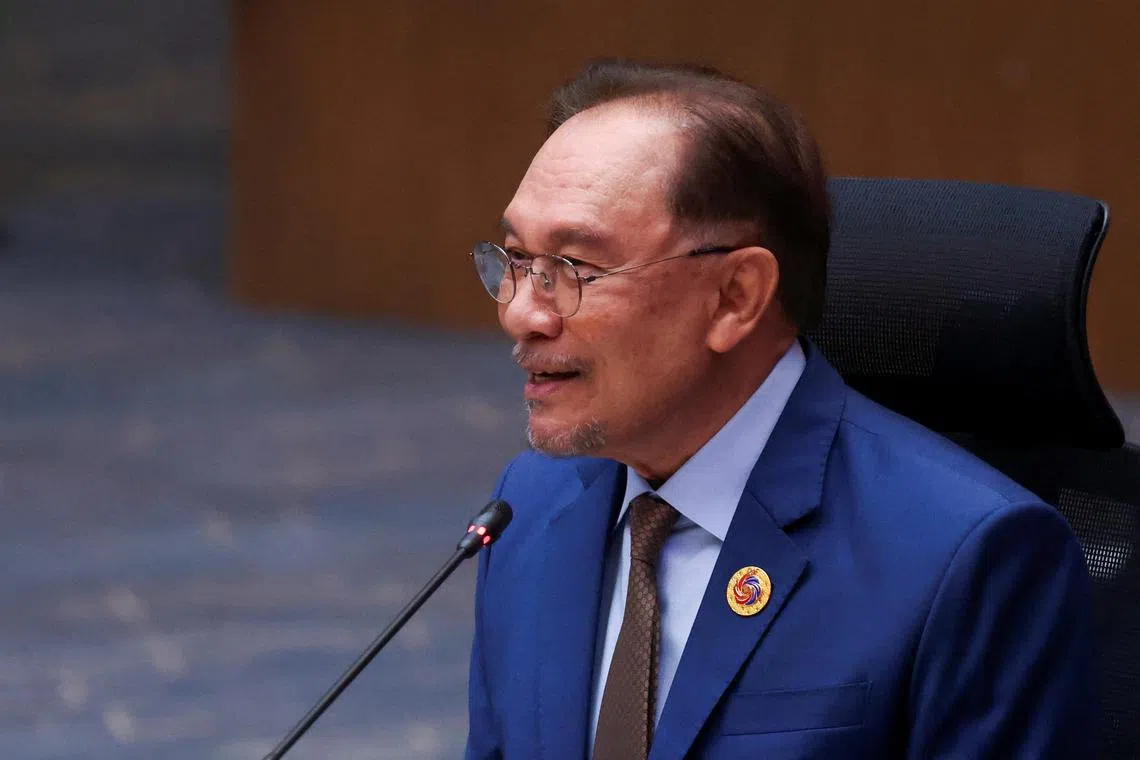Malaysia PM hails ‘significant’ engagement with Myanmar as South-east Asian leaders meet
Sign up now: Get insights on the biggest stories in Malaysia

Malaysian PM Anwar Ibrahim, the current Asean chair, held a closed-door meeting in Bangkok in April with Myanmar junta chief Min Aung Hlaing.
PHOTO: REUTERS
KUALA LUMPUR – Malaysian Prime Minister Anwar Ibrahim on May 26 hailed “significant” steps to engage warring sides in Myanmar, as South-east Asian leaders met for talks to address the protracted conflict and offset global trade uncertainty from US President Donald Trump’s tariff threats.
Myanmar has been in turmoil since its military overthrew the elected civilian government of Nobel laureate Aung San Suu Kyi in 2021, triggering pro-democracy protests that morphed into a widening rebellion and conflict that has displaced more than 3.5 million people, according to the United Nations.
Asean leaders were expected to discuss ways to jump-start Asean’s faltering Myanmar peace process and build on recent efforts by Datuk Seri Anwar
Mr Anwar in April held a closed-door meeting in Bangkok with junta chief Min Aung Hlaing and virtual talks with the shadow National Unity Government, describing those talks on May 26 as “significant” but fragile.
“We have been able to move the needle forward in our efforts for the eventual resolution of the Myanmar crisis,” he said while opening the summit in Kuala Lumpur.
“I wish to stress that throughout this process, quiet engagement has mattered. The steps may be small and the bridge may be fragile but as they say, in matters of peace, even a fragile bridge is better than a widening gulf.”
The junta aims to hold an election later in 2025
Asean’s top diplomats held special meetings on Myanmar over the weekend, even as Malaysian Foreign Minister Mohamad Hasan stressed that a lot of negotiating was needed and said he would visit Myanmar in June.
The ministers agreed to discuss creating a permanent Asean envoy for Myanmar, possibly for terms of three years, rather than changing envoys each year, he added.
Thailand’s foreign minister last week said he intended to propose broader international engagement with the junta, which remains barred from Asean summits over its failure to follow the peace plan.
Tariff tremors
Asean leaders will meet Chinese Premier Li Qiang for an economic summit on May 27, along with their counterparts from Gulf countries, at a time of global market volatility and slowing economic growth sparked by Mr Trump’s tariff threats.
Six South-east Asian countries targeted by Washington face steep tariffs
Mr Anwar said on May 25 that he had written to Mr Trump to request a meeting on the tariffs between the US and Asean, a region with a combined gross domestic product of US$3.8 trillion (S$4.9 trillion).
In remarks ahead of the summit, Philippine President Ferdinand Marcos Jr said Asean leaders would compare responses to the tariffs, adding that “we must find a way to find consensus amongst the disparate situations that the different member states are operating under”.
Former Indonesian foreign minister Marty Natalegawa said Asean should identify key areas to guide each member country’s negotiations with Washington.
“Otherwise, there could be a risk of a lose-lose cycle in our own region,” he said.
Also up for discussion is advancing Asean’s drawn-out talks with Beijing on a code of conduct for the South China Sea, where tensions have long simmered over the activities of China’s coast guard in the exclusive economic zones of its neighbours. China says it is operating lawfully in what are its waters.
The most heated confrontations have taken place between China and the Philippines, with Mr Marcos on May 25 calling for urgency in completing a legally binding code.
“This is to safeguard maritime rights, promote stability and prevent miscalculations,” he said. REUTERS


